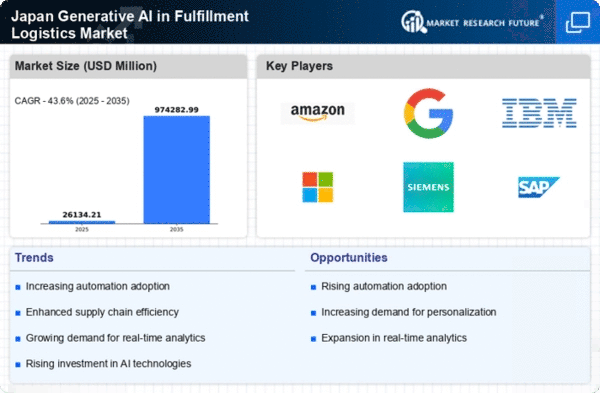Advancements in AI Technology
Technological advancements in artificial intelligence are significantly impacting the generative ai-in-fulfillment-logistics market. Innovations in machine learning and natural language processing are enabling logistics companies to automate complex processes and improve decision-making. In Japan, the adoption of AI technologies is expected to increase by 30% over the next few years, as businesses seek to enhance efficiency and reduce human error. Generative AI applications are being utilized for demand forecasting, route optimization, and real-time tracking, which are essential for maintaining competitive advantage. This technological evolution is likely to reshape the logistics landscape, making it imperative for companies to invest in generative AI solutions.
Government Support for AI Initiatives
The Japanese government is actively promoting the adoption of AI technologies across various sectors, including logistics. Initiatives aimed at fostering innovation and enhancing productivity are likely to benefit the generative ai-in-fulfillment-logistics market. Financial incentives and grants are being offered to companies that invest in AI-driven solutions, which could lead to a 15% increase in AI adoption rates within the logistics industry. This supportive regulatory environment encourages businesses to explore generative AI applications for improving supply chain efficiency and reducing costs. As government policies continue to evolve, they are expected to play a pivotal role in shaping the future of the logistics landscape.
Rising Demand for E-commerce Solutions
The surge in e-commerce activities in Japan is driving the generative ai-in-fulfillment-logistics market. As consumers increasingly prefer online shopping, businesses are compelled to enhance their logistics capabilities. This shift necessitates the integration of generative AI technologies to optimize inventory management and streamline order fulfillment processes. According to recent data, the e-commerce sector in Japan is projected to grow at a CAGR of 10% through 2025, indicating a robust demand for innovative logistics solutions. Companies are leveraging generative AI to improve delivery times and reduce operational costs, thereby enhancing customer satisfaction. This trend underscores the critical role of generative AI in meeting the evolving needs of the e-commerce landscape.
Labor Shortages in the Logistics Sector
Japan is currently facing significant labor shortages, particularly in the logistics sector, which is influencing the generative ai-in-fulfillment-logistics market. With an aging population and declining workforce, companies are increasingly turning to generative AI to fill the gaps left by human labor. This technology can automate repetitive tasks, thereby allowing existing employees to focus on more strategic activities. Reports indicate that logistics firms adopting AI solutions can reduce labor costs by up to 25%, making it a financially viable option. The urgency to address labor shortages is propelling the adoption of generative AI, as businesses strive to maintain operational efficiency and service quality.
Focus on Customer Experience Enhancement
In the competitive landscape of logistics, enhancing customer experience has become a priority for many companies in Japan. the generative AI in fulfillment logistics market is responding to this demand by providing solutions that improve service delivery and personalization. Businesses are utilizing generative AI to analyze customer data and predict preferences, enabling them to tailor their offerings accordingly. This focus on customer-centric logistics is likely to drive market growth, as companies that leverage AI technologies can achieve higher customer satisfaction rates. Studies suggest that organizations that prioritize customer experience can see revenue growth of up to 20%, highlighting the potential impact of generative AI on logistics operations.
















